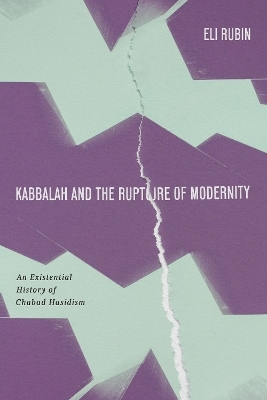
Kabbalah and the Rupture of Modernity
An Existential History of Chabad Hasidism
Seiten
2025
Stanford University Press (Verlag)
978-1-5036-4207-2 (ISBN)
Stanford University Press (Verlag)
978-1-5036-4207-2 (ISBN)
- Noch nicht erschienen (ca. März 2025)
- Versandkostenfrei
- Auch auf Rechnung
- Artikel merken
Kabbalah and the Rupture of Modernity provides a comprehensive intellectual and institutional history of Chabad Hasidism through the Kabbalistic concept of ṣimṣum. The onset of modernity, Eli Rubin argues, was heralded by this startling idea: existence itself is predicated on a self-inflicted "rupture" in the infinite assertion of divinity. Centuries of theoretical disputations concerning ṣimṣum ultimately morphed into religious and social schism. These debates confronted the meaning of being and forged the animating ethos of Chabad, the most dynamic movement in modern Judaism.
Chabad's distinctive character and self-image, Rubin shows, emerged from its spirited defense of Hasidism's interpretation of ṣimṣum as an act of love leading to rapturous reunion. This interpretation ignited a literal conflagration, complete with book burnings, denunciations, investigations and arrests. Chabad's subsequent preoccupation with ṣimṣum was equally significant for questions of legitimacy, authority, and succession as for existential questions of being and meaning.
Unfolding the story of Chabad from the early modern period to the twentieth century, this book provides fresh portraits of the successive leaders of the movement. Innovatively integrating history, philosophy, and literature, Rubin shows how Kabbalistic ideas are crucially entangled in the experience of modernity and in the response to its ruptures.
Chabad's distinctive character and self-image, Rubin shows, emerged from its spirited defense of Hasidism's interpretation of ṣimṣum as an act of love leading to rapturous reunion. This interpretation ignited a literal conflagration, complete with book burnings, denunciations, investigations and arrests. Chabad's subsequent preoccupation with ṣimṣum was equally significant for questions of legitimacy, authority, and succession as for existential questions of being and meaning.
Unfolding the story of Chabad from the early modern period to the twentieth century, this book provides fresh portraits of the successive leaders of the movement. Innovatively integrating history, philosophy, and literature, Rubin shows how Kabbalistic ideas are crucially entangled in the experience of modernity and in the response to its ruptures.
Eli Rubin is a contributing editor at Chabad.org. He received his PhD from the Department of Hebrew and Jewish Studies, University College London.
| Erscheint lt. Verlag | 25.3.2025 |
|---|---|
| Reihe/Serie | Stanford Studies in Jewish Mysticism |
| Zusatzinfo | 1 halftone |
| Verlagsort | Palo Alto |
| Sprache | englisch |
| Maße | 152 x 229 mm |
| Themenwelt | Geschichte ► Teilgebiete der Geschichte ► Kulturgeschichte |
| Geschichte ► Teilgebiete der Geschichte ► Religionsgeschichte | |
| Geisteswissenschaften ► Religion / Theologie ► Judentum | |
| ISBN-10 | 1-5036-4207-0 / 1503642070 |
| ISBN-13 | 978-1-5036-4207-2 / 9781503642072 |
| Zustand | Neuware |
| Informationen gemäß Produktsicherheitsverordnung (GPSR) | |
| Haben Sie eine Frage zum Produkt? |
Mehr entdecken
aus dem Bereich
aus dem Bereich
der stille Abschied vom bäuerlichen Leben in Deutschland
Buch | Hardcover (2023)
C.H.Beck (Verlag)
CHF 32,15
Die Revolution des Gemeinen Mannes
Buch | Softcover (2024)
C.H.Beck (Verlag)
CHF 16,80


